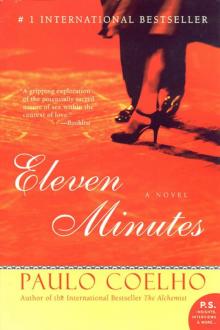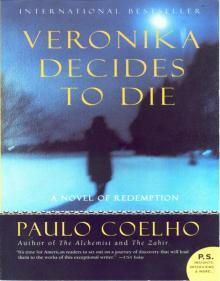- Home
- Paulo Coelho
Veronika Decides to Die: A Novel of Redemption Page 7
Veronika Decides to Die: A Novel of Redemption Read online
Page 7
He rang the bell and his secretary appeared.
"Call the young woman who tried to commit suicide," he said. "The one who wrote the letter to the newspapers, saying that she was killing herself in order to put Slovenia on the map."
"I don't want to see her. I've cut all my links with the outside world."
IT HAD been hard to say that in the lounge, with everyone else there. But the nurse hadn't been exactly discreet either, and had announced in a loud voice that her mother was waiting to see her, as if it were a matter of general interest.
She didn't want to see her mother; it would only upset both of them. It was best that her mother should think of her as dead. Veronika had always hated good-byes.
The man disappeared whence he had come, and she went back to looking at the mountains. After a week the sun had finally returned, something she had known would happen the previous night, because the moon had told her while she was playing the piano.
No, that's crazy, I'm losing my grip. Planets don't talk, or only to self-styled astrologers. If the moon spoke to anyone, it was to that schizophrenic.
The very moment she thought this, she noticed a sharp pain in her chest, and her arm went numb. Veronika felt her head spinning. A heart attack!
She entered a kind of euphoric state, as if death had freed her from the fear of dying. So it was all over. She might still experience some pain, but what were five minutes of agony in exchange for an eternity of peace? The only possible response was to close her eyes: In films the thing she most hated to see were dead people with staring eyes.
But the heart attack was different from what she had imagined; her breathing became laboured, and Veronika was horrified to realize that she was about to experience the worst of her fears: suffocation. She was going to die as if she were being buried alive or had suddenly been plunged into the depths of the sea.
She stumbled, fell, felt a sharp blow on her face, continued making heroic efforts to breathe, but the air wouldn't go in. Worst of all, death did not come. She was entirely conscious of what was going on around her, she could still see colors and shapes, although she had difficulty hearing what others were saying; the cries and exclamations seemed distant, as if coming from another world. Apart from this, everything else was real; the air wouldn't enter her lungs, it would simply not obey the commands of her lungs and her muscles, and still she did not lose consciousness.
She felt someone touch her and turn her over, but now she had lost control of her eye movements, and her eyes were flickering wildly, sending hundreds of different images to her brain, combining the feeling of suffocation with a sense of complete visual confusion.
After a while the images became distant too, and just when the agony reached its peak, the air finally rushed into her lungs, making a tremendous noise that left everyone in the room paralyzed with fear.
Veronika began to vomit copiously. Once the near-tragedy had passed, some of the crazy people there began to laugh, and she felt humiliated, lost, paralyzed.
A nurse came running in and gave her an injection in the arm.
"It's all right, calm down, it's over now."
"I didn't die!" she started shouting, crawling toward the other patients, smearing the floor and the furniture with her vomit. "I'm still in this damn hospital, forced to live with you people, living a thousand deaths every day, every night, and not one of you feels an ounce of pity for me."
She turned on the nurse, grabbed the syringe from his hand, and threw it out into the garden.
"And what do you want? Why don't you just inject me with poison, since I'm already condemned to die? How can you be so heartless?"
Unable to control herself any longer, she sat down on the floor again and started crying uncontrollably, shouting, sobbing loudly, while some of the patients laughed and made remarks about her filthy clothes.
"Give her a sedative," said a doctor, hurrying in. "Get this situation under control."
The nurse, however, was frozen to the spot. The doctor went out again and returned with two more male nurses and another syringe. The men grabbed the hysterical girl struggling in the middle of the room, while the doctor injected the last drop of sedative into a vein in her vomit-smeared arm.
She was in Dr. Igor's consulting room, lying on an immaculate white bed with clean sheets on it.
HE WAS listening to her heart. She was pretending that she was still asleep, but something inside her must have changed, judging by the doctor's muttered words:
"Don't you worry. In your state of health, you could live to be a hundred."
Veronika opened her eyes. Someone had taken her clothes off. Who? Dr. Igor? Did that mean he had seen her naked? Her brain wasn't working properly.
"What did you say?"
"I said not to worry."
"No, you said I could live to be a hundred."
The doctor went over to his desk.
"You said I could live to be a hundred," Veronika repeated.
"Nothing is certain in medicine," said Dr. Igor, trying to cover up. "Everything's possible."
"How's my heart?"
"The same."
She didn't need to hear any more. When faced with a serious case, doctors always say: "You'll live to be a hundred," or "There's nothing seriously wrong with you," or "You have the heart and blood pressure of a young girl," or even "We need to redo the tests." They're probably afraid the patient will go berserk in the consulting room.
She tried to get up, but couldn't; the whole room started to spin.
"Just lie down a bit longer, until you feel better. You're not bothering me."
Oh good, thought Veronika. But what if I were?
Being an experienced physician, Dr. Igor remained silent for some time, pretending to read the papers on his desk. When we're with other people and they say nothing, the situation becomes irritating, tense, unbearable. Dr. Igor was hoping that the girl would start talking so that he could collect more data for his thesis on insanity and the cure he was developing.
But Veronika didn't say a word. She may still be suffering from a high level of Vitriol poisoning, thought Dr. Igor, and decided to break the silence, which was becoming tense, irritating, unbearable.
"So you like to play the piano," he said, trying to sound as nonchalant as possible.
"And the lunatics enjoy it too. Yesterday there was a guy listening who was utterly transfixed."
"Yes, Eduard. He mentioned to someone how much he'd enjoyed it. Who knows, he might start eating normally again."
"A schizophrenic liking music? And he mentioned it to someone else?"
"Yes. And I imagine you have no idea what you're talking about."
That doctor--who looked more like a patient, with his dyed black hair--was right. Veronika had often heard the word "schizophrenic," but she had no idea what it meant.
"Is there a cure, then?" she asked, hoping to find out more about schizophrenics.
"It can be controlled. We still don't really know what goes on in the world of insanity. Everything's still so new, and the treatments change every decade or so. A schizophrenic is a person who already has a natural tendency to absent himself from this world, until some factor, sometimes serious, sometimes superficial, depending on the individual circumstances, forces him to create his own reality. It can develop into a state of complete alienation, what we call catatonia, but people do occasionally recover, at least enough to allow the patient to work and lead a near-normal life. It all depends on one thing: environment."
"You say they create their own reality," said Veronika, "but what is reality?"
"It's whatever the majority deems it to be. It's not necessarily the best or the most logical, but it's the one that supports the desires of society as a whole. You see this thing I've got around my neck?"
"You mean your tie?"
"Exactly. Your answer is the logical, coherent answer an absolutely normal person would give: It's a tie! A lunatic, however, would say that what I have round my neck is a rid
iculous, useless bit of colored cloth tied in a very complicated way, which makes it harder to get air into your lungs and difficult to turn your neck. I have to be careful when I'm anywhere near a fan, or I could be strangled by this bit of cloth.
"If a lunatic were to ask me what this tie is for, I would have to say, absolutely nothing. It's not even purely decorative, since nowadays it's become a symbol of slavery, power, aloofness. The only really useful function a tie serves is the sense of relief when you get home and take it off; you feel as if you've freed yourself from something, though quite what you don't know.
"But does that sense of relief justify the existence of ties? No. Nevertheless, if I were to ask a madman and a normal person what this is, the sane person would say: 'A tie.' It doesn't matter who's correct, what matters is who's right."
"So just because I gave the right name to a bit of colored cloth you conclude that I'm not mad."
No, you're not mad, thought Dr. Igor, who was an authority on the subject, with various diplomas hanging on the walls of his consulting room. Attempting to take your own life was something proper to a human being; he knew a lot of people who were doing just that, and yet they lived outside the hospital, feigning innocence and normality, merely because they had not chosen the scandalous route of suicide. They were killing themselves gradually, poisoning themselves with what Dr. Igor called Vitriol.
Vitriol was a toxic substance whose symptoms he had identified in his conversations with the men and women he had met. Now he was writing a thesis on the subject, which he would submit to the Slovenian Academy of Sciences for its scrutiny. It was the most important step in the field of insanity since Dr. Pinel had ordered that patients should be unshackled, astonishing the medical world with the idea that some of them might even be cured.
As with the libido--the chemical reaction responsible for sexual desire, which Dr. Freud had identified, but which no laboratory had ever managed to isolate--Vitriol was released by the human organism whenever a person found him-or herself in a frightening situation, although it had yet to be picked up in any spectrographic tests. It was easily recognized, though, by its taste, which was neither sweet nor savory--a bitter taste. Dr. Igor, the as-yet-unrecognized discoverer of this fatal substance, had given it the name of a poison much favored in the past by emperors, kings, and lovers of all kinds whenever they needed to rid themselves of some obstructive person.
A golden age, the age of kings and emperors, when you could live and die romantically. The murderer would invite his or her victim to partake of a magnificent supper, the servant would pour them drinks served in two exquisite glasses, and one of the drinks would be laced with Vitriol. Imagine the excitement aroused by each gesture the victim made, picking up the glass, saying a few tender or aggressive words, drinking as if the glass contained some delicious beverage, giving his host one last startled look, then falling to the floor.
But this poison, which was now very expensive and difficult to obtain, had been replaced by more reliable methods of extermination--revolvers, bacteria, and so on. Dr. Igor, a natural romantic, had rescued this name from obscurity and given it to the disease of the soul he had managed to diagnose, and whose discovery would soon astonish the world.
It was odd that no one had ever described Vitriol as a mortal poison, although most of the people affected could identify its taste, and they referred to the process of poisoning as bitterness. To a greater or lesser degree, everyone had some bitterness in their organism, just as we are all carriers of the tuberculosis bacillus. But these two illnesses only attack when the patient is debilitated; in the case of bitterness, the right conditions for the disease occur when the person becomes afraid of so-called reality.
Certain people, in their eagerness to construct a world no external threat can penetrate, build exaggeratedly high defenses against the outside world, against new people, new places, different experiences, and leave their inner world stripped bare. It is there that bitterness begins its irrevocable work.
The will was the main target of bitterness (or Vitriol, as Dr. Igor preferred to call it). The people attacked by this malaise began to lose all desire, and, within a few years, they became unable to leave their world, where they had spent enormous reserves of energy constructing high walls in order to make reality what they wanted it to be.
In order to avoid external attack, they had also deliberately limited internal growth. They continued going to work, watching television, having children, complaining about the traffic, but these things happened automatically, unaccompanied by any particular emotion, because, after all, everything was under control.
The great problem with poisoning by bitterness was that the passions--hatred, love, despair, enthusiasm, curiosity--also ceased to manifest themselves. After a while the embittered person felt no desire at all. He or she lacked the will either to live or to die, that was the problem.
That is why embittered people find heroes and madmen a perennial source of fascination, for they have no fear of life or death. Both heroes and madmen are indifferent to danger and will forge ahead regardless of what other people say. The madman committed suicide, the hero offered himself up to martyrdom in the name of a cause, but both would die, and the embittered would spend many nights and days remarking on the absurdity and the glory of both. It was the only moment when the embittered person had the energy to clamber up his defensive walls and peer over at the world outside, but then his hands and feet would grow tired, and he would return to daily life.
The chronically embittered person only noticed his illness once a week, on Sunday afternoons. Then, with no work or routine to relieve the symptoms, he would feel that something was very wrong, since he found the peace of those endless afternoons infernal and felt only a keen sense of constant irritation.
Monday would arrive, however, and the embittered man would immediately forget his symptoms, although he would curse the fact that he never had time to rest and would complain that the weekends always passed far too quickly.
From the social point of view, the only advantage of the disease was that it had become the norm, and internment was no longer necessary except in cases where the poisoning was so severe that the patient's behavior began to affect others. Most embittered people, though, could continue to live outside, constituting no threat to society or to others, since, because of the high walls with which they had surrounded themselves, totally isolated them from the world, even though they appeared to participate in it.
Dr. Sigmund Freud had discovered the libido and a cure for the problems it caused, in the form of psychoanalysis. Apart from discovering the existence of Vitriol, Dr. Igor needed to prove that a cure for it was also possible. He wanted to leave his mark on the history of medicine, although he had no illusions about the difficulties he would face when it came to publishing his ideas, for "normal" people were content with their lives and would never admit to the existence of such an illness, while the "sick" fed a gigantic industry of mental hospitals, laboratories, conferences, and so on.
I know the world will not recognize my efforts, he said to himself, proud of being misunderstood. After all, that was the price every genius had to pay.
"Is anything wrong, doctor?" asked the girl. "You seem to have drifted off into the world of your patients."
Dr. Igor ignored the disrespectful comment.
"You can go now," he said.
Veronika didn't know if it was day or night. Dr. Igor had the light on, but then he did every morning. It was only when she reached the corridor and saw the moon that she realized she had slept far longer than she had thought.
ON THE way to the ward, she noticed a framed photograph on the wall: It was of the main square in Ljubljana, before the statue of the poet Preseren had been put up; it showed couples strolling, probably on a Sunday.
She looked at the date on the photograph: the summer of 1910.
The summer of 1910. There were all those people, whose children and grandchildren had already died, frozen in
one particular moment of their lives. The women wore voluminous dresses, and the men were all wearing a hat, jacket, gaiters, tie (or "that colored piece of cloth," as the insane call it), and carrying an umbrella under one arm.
And how hot would it have been then? The temperature must have been what it would be today in summer, ninety-five degrees in the shade. If an Englishman turned up in clothing more suited to the heat--in Bermuda shorts and shirtsleeves--what would those people have thought?
"He must be crazy."
She had understood perfectly what Dr. Igor meant, just as she understood that, although she had always felt loved and protected, there had been one missing element that would have transformed that love into a blessing: She should have allowed herself to be a little crazier.
Her parents would still have loved her, but, afraid of hurting them, she had not dared to pay the price of her dream. That dream was now buried in the depths of her memory, although sometimes it was awoken by a concert or by a beautiful record she happened to hear. Whenever that happened, though, the feeling of frustration was so intense that she immediately sent it back to sleep again.
Veronika had known since childhood that her true vocation was to be a pianist.
This was something she had felt ever since her first lesson, at twelve. Her teacher had recognized her talent too and had encouraged her to become a professional. But, whenever she had felt pleased about a competition she had just won and said to her mother that she intended to give up everything and dedicate herself to the piano, her mother would look at her fondly and say: "No one makes a living playing the piano, my love."
"But you were the one who wanted me to have lessons."
"To develop your artistic gifts, that's all. A husband likes that kind of thing in a wife; he can show you off at parties. Forget about being a pianist, and go and study law, that's the profession of the future."

 The Alchemist
The Alchemist Maktub
Maktub Like the Flowing River
Like the Flowing River The Winner Stands Alone
The Winner Stands Alone The Spy
The Spy By the River Piedra I Sat Down and Wept: A Novel of Forgiveness
By the River Piedra I Sat Down and Wept: A Novel of Forgiveness Eleven Minutes
Eleven Minutes Manuscript Found in Accra
Manuscript Found in Accra Warrior of the Light
Warrior of the Light Veronika Decides to Die: A Novel of Redemption
Veronika Decides to Die: A Novel of Redemption The Devil and Miss Prym: A Novel of Temptation
The Devil and Miss Prym: A Novel of Temptation The Valkyries: An Encounter With Angels
The Valkyries: An Encounter With Angels Brida: A Novel
Brida: A Novel Fifth Mountain: A Novel
Fifth Mountain: A Novel Adultery
Adultery Inspirations
Inspirations The Archer
The Archer The Witch of Portobello
The Witch of Portobello The Pilgrimage
The Pilgrimage The Zahir
The Zahir Brida
Brida The Fifth Mountain
The Fifth Mountain Like the Flowing River: Thoughts and Reflections
Like the Flowing River: Thoughts and Reflections Manual of the Warrior of Light
Manual of the Warrior of Light By The River Piedra I Sat Down & Wept
By The River Piedra I Sat Down & Wept The Supreme Gift
The Supreme Gift Aleph
Aleph Hippie
Hippie Witch of Portobello
Witch of Portobello The Devil and Miss Prym
The Devil and Miss Prym The Alchemist - 10th Anniversary Edition
The Alchemist - 10th Anniversary Edition The Valkyries
The Valkyries